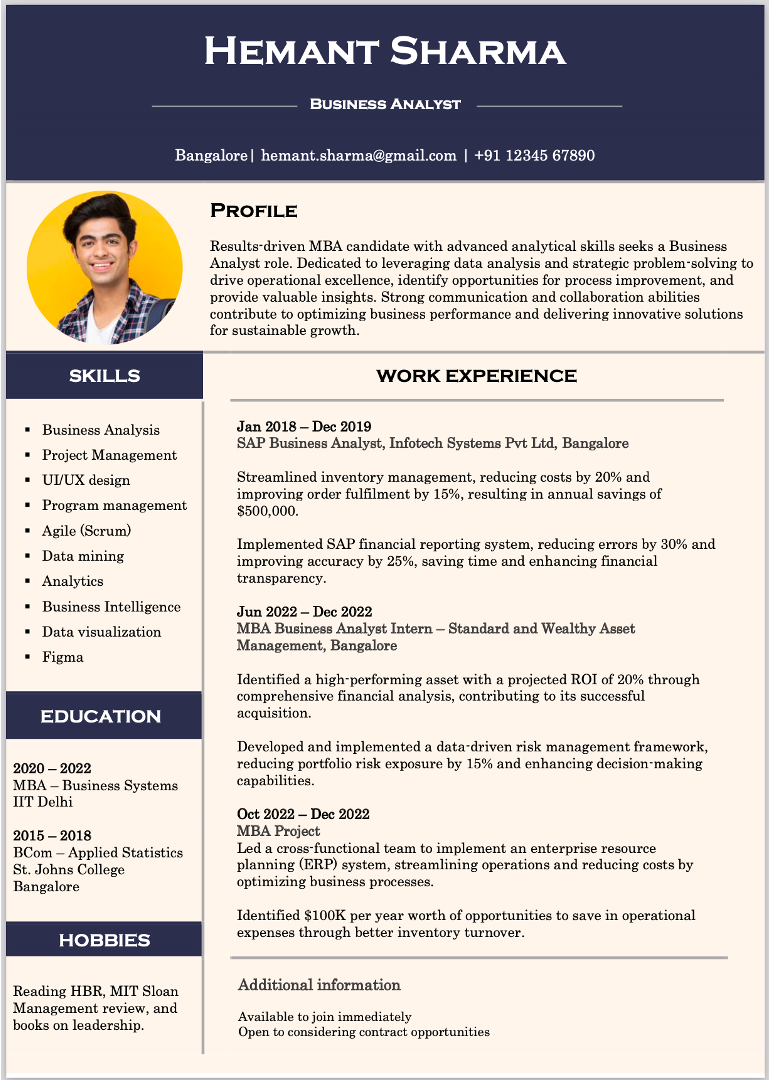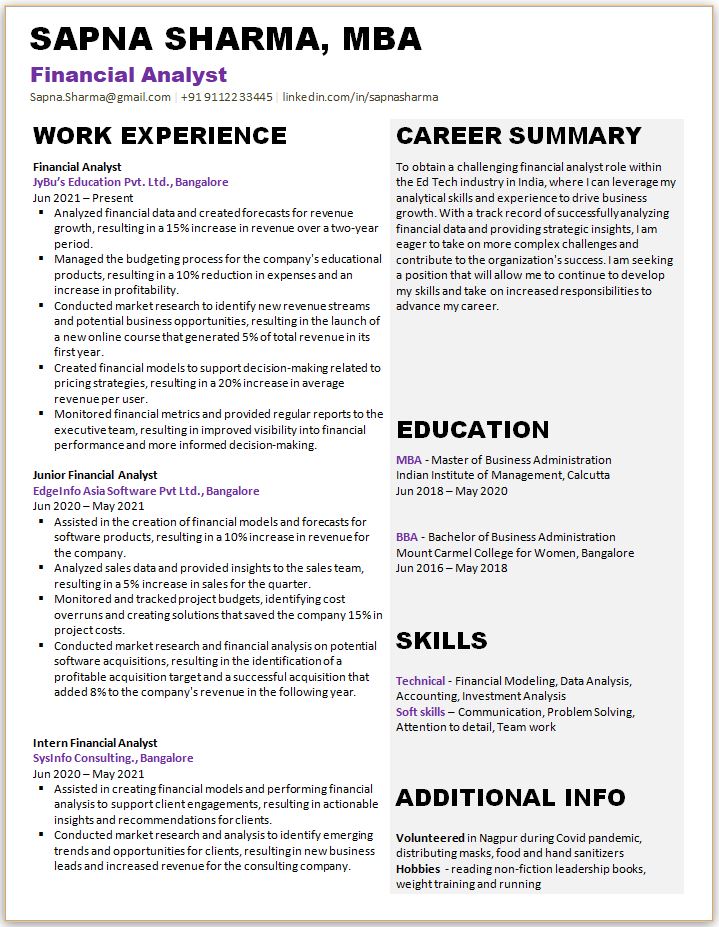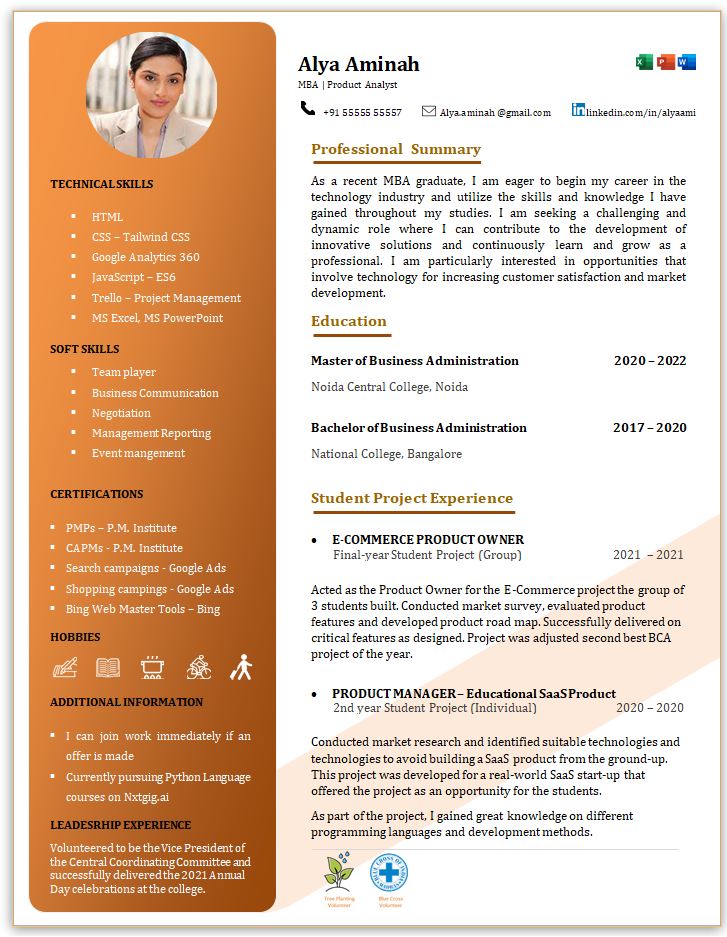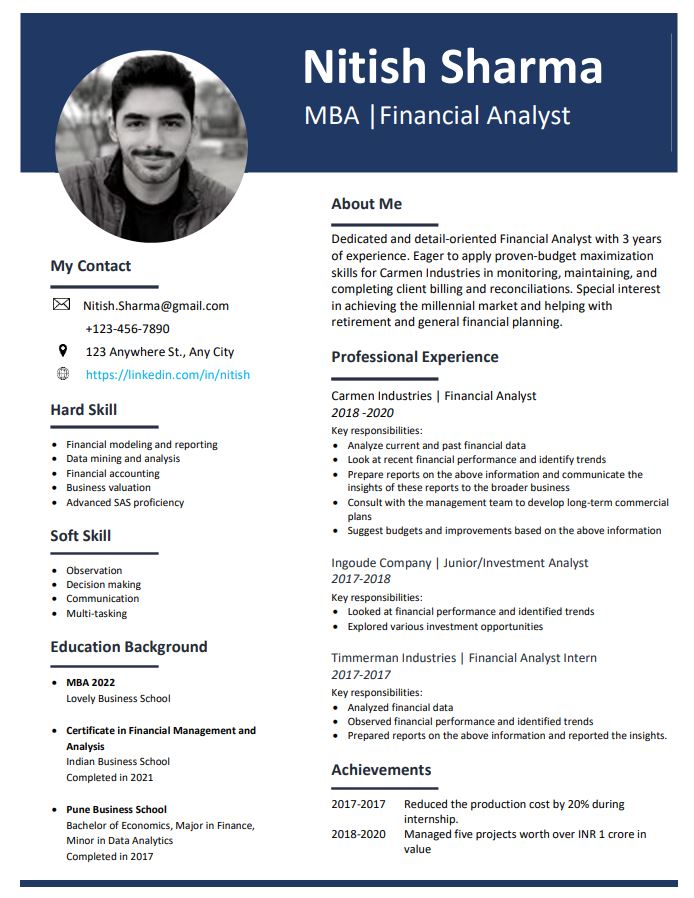Managing Self Introduction in Interview - with examples

22 Aug 2023

Self introduction interview - the first hurdle or opportunity?
As you step into the realm of job interviews, the first impression you make with your self introduction can shape your entire experience. Is it merely a challenge to overcome, or does it offer a chance to showcase your strengths? In this extensive article, we dive into the art of self introduction, exploring how this simple task can highlight your skills and personality.
You'll find practical advice, expert tips, and real examples that uncover the potential of those initial moments. Whether you're new to the workforce or a seasoned professional, our guide to self introduction in job interviews will help you confidently approach this crucial phase, making it a platform to stand out and make your mark.
Table of Contents
- How to offer a great first impression in an interview
- How to best introduce yourself in an interview
- Sentences to use and examples of self Introduction
- What should self introduction interview address
- Sample answers introduction yourself for freshers
- Sample answers introduction yourself for experienced candidates
- Mistakes to avoid in self introduction
- How long should self introduction be?
By the way, we have a variety of resume templates that focus on teamwork in the way work achievements are listed. If you have not checked them out, take a look at Sample Resume Formats
Creating the Best and Impactful First Impression in an Interview
The first impression you create in a job interview can significantly influence the outcome of your candidacy. Here are key strategies to ensure you leave a positive and lasting impact right from the start:
1. Dress the Part:Choose attire that aligns with the company culture and the role you're interviewing for. Dressing professionally shows respect for the opportunity and reflects your seriousness.
2. Confidence and Warmth:Walk into the interview room with confidence. Maintain eye contact, offer a firm handshake, and greet the interviewer with a genuine smile. A warm demeanor helps establish rapport.
3. Polished Self Introduction:Your self introduction sets the tone. State your name, a brief background, and express enthusiasm for the role. Keep it concise yet engaging, showcasing your communication skills.
4. Research and Engagement:Display your interest by discussing the company's recent achievements or projects. Showing knowledge about the company demonstrates your proactive research and commitment.
5. Tailor Your Pitch:Craft a concise summary of your skills and experience relevant to the job. Highlight accomplishments that demonstrate your suitability and value to the organization.
6. Positivity:Radiate positivity through your body language, tone of voice, and attitude. An optimistic outlook can leave a memorable impression and convey your enthusiasm for the opportunity.
7. Active Listening:Pay attention to the interviewer's questions and comments. Engage actively in the conversation, demonstrating your ability to comprehend, process, and respond effectively.
8. Ask Thoughtful Questions:Prepare questions about the role, team, and company culture. Intelligent inquiries show your genuine interest in the position and your proactive approach.
9. Elevator Pitch:Have a concise elevator pitch ready that outlines your skills, experience, and what sets you apart. This succinct summary can make a strong impact during initial interactions.
10. Gratitude and Closure:Express appreciation for the opportunity to interview. Reiterate your enthusiasm for the role and company. A gracious conclusion leaves a positive and respectful final impression.
Mastering these tactics ensures that your first impression showcases your professionalism, enthusiasm, and alignment with the role and organization. By nailing your initial interactions, you lay a solid foundation for a successful interview journey.
How to best introduce yourself in an interview
Mastering the art of introducing yourself in an interview is a crucial step towards creating a strong first impression. Follow these steps to ensure you present yourself confidently and leave a positive impact:
1. Prepare Your Elevator Pitch:Craft a concise elevator pitch that encapsulates your background, skills, and what you bring to the table. This succinct introduction should be engaging and tailored to the job you're applying for.
Example of an Elevator Pitch:
"Good afternoon, my name is Emily Johnson. I recently graduated with a Bachelor's degree in Computer Science and have since completed internships with two tech startups, where I gained hands-on experience in full-stack web development and data analysis. I'm truly excited about the opportunity to interview for the software engineer position at ABC Tech. My passion lies in creating innovative solutions that enhance user experiences, and I've had the chance to contribute to projects that improved website responsiveness and user engagement. I'm confident that my technical skills and adaptability align well with the dynamic environment at ABC Tech, and I'm eager to bring my problem-solving abilities and collaborative mindset to the team. Thank you for considering my application."
In this example, the elevator pitch succinctly introduces the candidate's name, educational background, relevant experience, enthusiasm for the role, and alignment with the company's needs. It serves as a concise yet comprehensive introduction that leaves a positive and memorable impression on the interviewer.
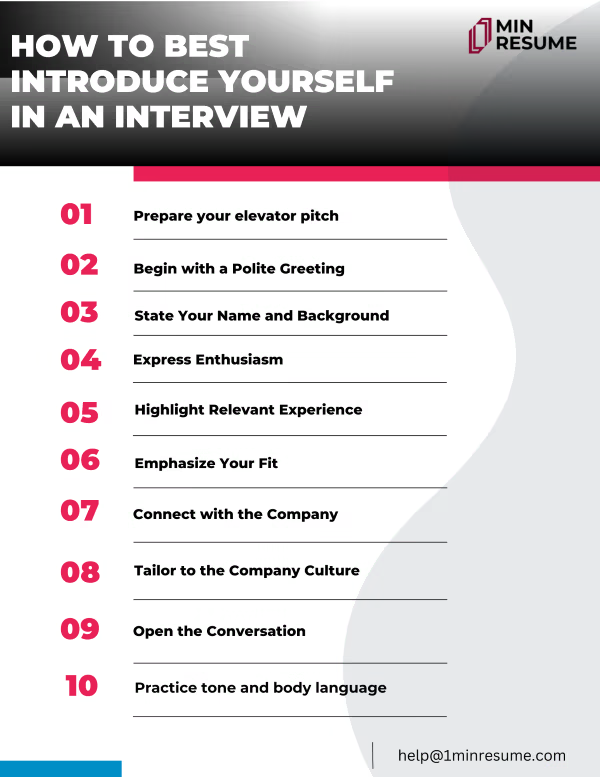
Initiate the conversation with a polite greeting, such as "Good morning/afternoon." This sets a friendly tone and establishes a positive starting point for the interaction.
Example of a Polite Greeting:
"Good morning, it's a pleasure to meet you."
In this example, the candidate initiates the conversation with a simple and polite greeting, setting a positive tone for the interview interaction. The use of a courteous greeting establishes a friendly atmosphere and reflects professionalism and respect.
3. State Your Name and Background:State your full name clearly, followed by a brief mention of your educational and professional background. Keep this introduction succinct, focusing on the most relevant aspects.
4. Express Enthusiasm:Express your excitement about the opportunity to interview for the position. Conveying genuine enthusiasm shows your interest in the role and company.
Example of Expressing Enthusiasm:
"I'm thrilled to have the opportunity to interview for the marketing coordinator position at XYZ Company. I've been following the company's innovative campaigns and impactful initiatives, and I'm genuinely excited about the possibility of contributing to such a dynamic team."
In this example, the candidate conveys genuine excitement and eagerness for the interview opportunity. By expressing enthusiasm, the candidate demonstrates a strong interest in the company and the role, which can leave a positive impression on the interviewer.
5. Highlight Relevant Experience:Share a quick overview of your relevant experience that directly relates to the job requirements. Mention key accomplishments or projects that showcase your skills.
6. Emphasize Your Fit:Explain why you believe you're a strong fit for the role and how your skills align with the company's needs. This demonstrates your understanding of the position.
7. Connect with the Company:Reference the company's achievements or recent projects you admire. This shows you've done your research and are genuinely interested in their work.
Example of Connecting with the Company:
"I've been particularly impressed by ABC Company's dedication to sustainable practices and your recent initiatives to reduce carbon emissions. It aligns with my personal values, and I'm excited about the prospect of joining a team that is committed to making a positive impact on the environment."
In this example, the candidate references a specific aspect of the company's values or achievements that resonates with them. By connecting with the company on a meaningful level, the candidate shows that they've done their research and are genuinely interested in the company's mission and goals.
8. Tailor to the Company Culture:Adapt your introduction to the company's culture. If they value innovation, emphasize your creative thinking; if teamwork is key, mention your collaboration skills.
Example of Tailoring to the Company Culture:
"From my research, I've learned that collaboration is a cornerstone of XYZ Team's success. My experience working in cross-functional teams during my previous role as a project manager has honed my ability to communicate effectively and work harmoniously with diverse teams. I'm confident that my collaborative nature will align well with the teamwork-focused culture here."
In this example, the candidate tailors their introduction to highlight a specific aspect of the company culture—collaboration. By showcasing how their experience aligns with the company's values, the candidate demonstrates their suitability for the team and their understanding of what makes the company unique.
9. Open the Conversation:Invite the interviewer to ask questions or guide the conversation further. This displays your openness to discussing your qualifications and experiences.
Example of Opening the Conversation:
"I'm eager to dive into our discussion further and explore how my background aligns with the goals of the role. Please feel free to ask any questions you may have about my experience, skills, or the ways I believe I can contribute to the success of the team."
In this example, the candidate initiates a smooth transition from their introduction to an invitation for the interviewer to ask questions. This approach encourages engagement and demonstrates the candidate's willingness to discuss their qualifications in more detail.
10. Practice, Tone, and Body Language:Practice your introduction to ensure a confident delivery. Pay attention to your tone of voice and body language, conveying professionalism and positivity.
By following these steps, you'll be well-equipped to introduce yourself effectively in an interview, setting a positive tone for the conversation and making a lasting impression.
Ready to use modern resume templates
We have simplified the resume creation process for both fresh graduates and experienced professionals by showing examples how to list skills, work experiences, project experiences and hobbies and interests for a variety of jobs and functions. You can find some of them below.
Sentences to use and examples of self Introduction
During a job interview, your self introduction serves as a key opportunity to present yourself confidently and make a positive impression. Here are ten examples of sentences to use for a compelling self introduction:
1. Background and Enthusiasm:"Hello, I'm [Your Name], a recent graduate with a degree in Marketing. I'm excited about the chance to apply my creativity and strategic thinking to contribute to your innovative team."
2. Relevant Experience:"Hi there, I'm [Your Name], and I've spent the past three years as a project manager, successfully delivering complex projects on time and within budget."
3. Skills and Passion:"Greetings, I'm [Your Name], a data analyst with a passion for uncovering insights from complex datasets using advanced statistical techniques."
4. Problem-Solving Focus:"Good day, I'm [Your Name], a software engineer who thrives on solving challenging coding problems and crafting efficient solutions."
5. Company Knowledge:"Nice to meet you, I'm [Your Name], and I've been following [Company Name]'s impressive growth and am excited to be considered for the role of marketing coordinator."
6. Alignment with Values:"Hi, I'm [Your Name], a dedicated HR professional who values creating inclusive workplaces and fostering employee growth, which is why I'm drawn to [Company Name]."
7. Interpersonal Skills:"Hello there, I'm [Your Name], a customer service specialist with a knack for building rapport and ensuring each interaction leaves a positive impression."
8. Technical Expertise:"Greetings, I'm [Your Name], a skilled UX designer with proficiency in creating intuitive user interfaces that enhance user experiences."
9. Problem-Solving and Adaptability:"Hi, I'm [Your Name], a supply chain manager who thrives in dynamic environments, finding innovative solutions to streamline processes and ensure optimal efficiency."
10. Career Transition:"Nice to meet you, I'm [Your Name], an accountant with a solid background in finance, and I'm excited to leverage my analytical skills in a new career direction as a data scientist."
These examples showcase various approaches to self introduction, allowing you to tailor your introduction to highlight your strengths, experience, and alignment with the company's needs. Remember, a well-crafted self introduction can set a positive tone for the interview and pave the way for a successful conversation.
What should self introduction interview address
Delivering a compelling self introduction during a job interview requires addressing key aspects that provide a comprehensive understanding of your suitability for the role. Your self introduction serves as an opportunity to showcase your identity, qualifications, and enthusiasm for the position. In this section, we explore the essential components that your self introduction should cover. From highlighting your relevant background and skills to demonstrating alignment with the company's values, we'll guide you through creating a self introduction that leaves a lasting impression on the interviewer.
When delivering a self introduction during a job interview, it's essential to cover key aspects that provide the interviewer with a well-rounded understanding of who you are and why you're an excellent fit for the role. Here's what your self introduction should address:
1. Your Identity:
Start by stating your name clearly. This may seem like a basic step, but it's an important one. A clear introduction with your name creates an immediate connection and helps the interviewer remember you. Remember to maintain a confident and approachable tone.
2. Relevant Background:
Briefly mention your educational background and any degrees or certifications that directly relate to the position you're interviewing for. This provides context and shows that you have the foundational knowledge necessary for the role.
3. Professional Experience:
Share a concise overview of your work experience, focusing on the roles that are most relevant to the job. Highlight your responsibilities and key accomplishments that demonstrate your qualifications and expertise.
4. Skills and Strengths:
Highlight the skills that directly align with the job requirements. These could be technical skills, such as programming languages or design software, as well as soft skills like communication, problem-solving, and teamwork. Use examples to showcase your strengths.
5. Passion and Motivation:
Express your enthusiasm for the position and the company. Explain what excites you about the role and how it aligns with your career aspirations. This demonstrates that you're genuinely interested in the opportunity.
6. Alignment with the Company:
Connect your background and skills to the company's values, goals, and mission. Mention specific aspects of the company that resonate with you and show that you've done your research. This indicates your dedication to being a valuable contributor.
7. Unique Value Proposition:
Communicate what sets you apart from other candidates. Share specific accomplishments or experiences that demonstrate your value to the organization. Highlight how your unique skills can benefit the team.
8. Future Contribution:
Offer a glimpse of how you envision contributing to the team. Discuss your potential impact and what you hope to achieve in the role. This showcases your forward-thinking mindset and eagerness to make a difference.
9. Teamwork and Collaboration:
Emphasize your ability to work collaboratively in teams. Mention instances where you've successfully collaborated with others to achieve goals. This demonstrates your adaptability and interpersonal skills.
10. Professionalism and Communication:
Throughout your self introduction, maintain a professional tone, and convey confidence in your communication. Your body language and speech should reflect your ability to represent the company well in various situations.
In conclusion, your self introduction in an interview is an opportunity to paint a vivid picture of who you are and what you bring to the table. By addressing these key aspects, you create a well-rounded introduction that showcases your qualifications, enthusiasm, and alignment with the company's values. Remember to tailor your self introduction to each specific interview, and practice delivering it with confidence. With the right approach, your self introduction can set a positive tone and pave the way for a successful interview journey.
Sample answers introduction yourself for freshers
Self introductions for fresh graduates is different from that of experienced professionals.
A fresh graduate's self introduction emphasizes potential, transferable skills, and enthusiasm, while an experienced candidate's introduction focuses on a proven track record, specific accomplishments, and industry expertise. Both approaches should be tailored to the job and company culture to effectively demonstrate fit and value.
Fresh Graduate's Self Introduction Focus Areas:1. Emphasis on Education: Fresh graduates typically highlight their educational background, including degrees, majors, and any relevant coursework.
2. Limited Work Experience: They may have internships or part-time jobs, but their focus is on showcasing transferable skills gained through these experiences.
3. Potential and Enthusiasm: Fresh graduates emphasize their potential for growth, enthusiasm for the field, and willingness to learn and adapt.
4. Projects and Coursework: They may discuss relevant projects, research, or coursework that aligns with the job requirements.
5. Aspirations: Fresh graduates often express their career aspirations and desire to contribute positively to the company.
Experienced Candidate's Self Introduction Focus Areas:1. Work History: Experienced candidates emphasize their work history, detailing roles, responsibilities, and achievements in previous positions.
2. Industry Expertise: They highlight their industry-specific knowledge, demonstrating a deep understanding of the field.
3. Accomplishments: Experienced candidates showcase their significant achievements, contributions to teams, and impact on projects.
4. Skills Application: They discuss how their skills and experience directly relate to the role, demonstrating their ability to hit the ground running.
5. Leadership and Management: If applicable, they may discuss leadership roles, team management, or mentorship experiences.
6. Networking and Connections: Experienced candidates can draw upon their professional network and industry relationships.
Sample Self Introduction Example for Freshers
1. Enthusiastic Marketing Graduate:"Hi, I'm Neha, a recent Marketing graduate eager to dive into the world of digital marketing. I've honed my skills through internships and coursework, and I'm excited to contribute my fresh ideas and passion for data-driven strategies to a dynamic team."
2. Aspiring Software Developer:"Hello, I'm Neha, a Computer Science graduate with a knack for coding and problem-solving. During my studies, I developed projects that showcase my programming abilities. I'm looking forward to applying my skills and learning from experienced professionals in a software development role."
3. Emerging Graphic Designer:"Greetings, I'm Neha, a Graphic Design graduate who thrives on creative challenges. My design projects have allowed me to experiment with various tools and styles. I'm excited to embark on a design career where I can bring fresh visual perspectives to the table."
4. Passionate Environmental Scientist:"Nice to meet you, I'm Neha, a recent Environmental Science graduate with a deep interest in sustainability and conservation. I've engaged in research projects that highlight my dedication to environmental issues. I'm eager to contribute my knowledge and enthusiasm to a team committed to making a positive impact."
5. Upcoming HR Professional:"Hi, I'm Neha, a Human Resources graduate who values cultivating positive workplace environments. Through coursework and internships, I've gained insights into effective recruitment and employee engagement strategies. I'm excited to begin my career in HR and make meaningful contributions to organizational success."
Sample answers introduction yourself for experienced candidates
Here are ten self introduction examples for experienced candidates. We have tried to cover various functions across an organization. Let us know if you need any help with crafting your self introduction.
1. Marketing Manager:"Greetings, I'm Rahul, a seasoned Marketing Manager with over 8 years of experience in devising strategic campaigns that drive brand visibility and revenue growth. My expertise lies in digital marketing, where I've successfully led cross-functional teams to execute data-driven campaigns with measurable results."
2. Software Engineer:"Hello, I'm Sarah, an accomplished Software Engineer with a decade of experience in developing complex web applications. My track record includes leading full-stack development teams and delivering innovative solutions that enhance user experiences and streamline operations."
3. Financial Analyst:"Hi there, I'm Alex, a seasoned Financial Analyst with 12 years of experience in analyzing market trends and advising on investment strategies. My portfolio includes successful risk assessments and optimization strategies for both individual and institutional clients."
4. Human Resources Director:"Nice to meet you, I'm Lisa, a Human Resources Director with a proven track record of 15 years in developing HR initiatives that foster employee engagement and organizational growth. I've managed diverse teams and implemented strategies that align with business objectives."
5. Operations Manager:"Hello, I'm Rajesh, an accomplished Operations Manager with 10 years of experience optimizing supply chain logistics and enhancing operational efficiency. I've overseen large-scale projects and consistently delivered results that exceed performance targets."
6. Sales Director:"Greetings, I'm Emily, a results-driven Sales Director with over 12 years of experience in building high-performing sales teams and driving revenue growth. I've successfully expanded market reach and secured key partnerships to achieve sustainable sales objectives."
7. Product Manager:"Hi there, I'm Jason, a seasoned Product Manager with a decade of experience bringing innovative products to market. My expertise includes product strategy, development lifecycle management, and collaborating with cross-functional teams to deliver customer-centric solutions."
8. Operations Analyst:"Nice to meet you, I'm Maya, an experienced Operations Analyst with 7 years of experience in optimizing processes and workflows. I've conducted in-depth data analysis to drive operational improvements and enhance overall efficiency within organizations."
9. Project Manager:"Hello, I'm Mark, an accomplished Project Manager with 9 years of experience successfully leading complex projects from initiation to completion. I excel at managing teams, mitigating risks, and ensuring projects are delivered on time and within budget."
10. Legal Counsel:"Greetings, I'm Priya, a seasoned Legal Counsel with 14 years of experience advising clients on complex legal matters. I've demonstrated expertise in contract negotiations, regulatory compliance, and litigation management, consistently delivering optimal outcomes for clients."
Feel free to customize these examples to match your own experiences and accomplishments as an experienced candidate.
Mistakes to avoid in self introduction
In the realm of job interviews, the self introduction is your first opportunity to make a positive impression. Crafting an impactful self introduction requires finesse, as it sets the tone for the rest of the interview. However, like any other skill, there are pitfalls that can undermine your efforts. Let us explore some common mistakes to avoid in self introductions, ensuring you start off on the right foot and make the most of your interview opportunity.
1. Being Overly Lengthy:Rambling self introductions can quickly lose the interviewer's attention. Avoid delving into excessive detail about your life history, personal anecdotes, or unrelated experiences. Stick to relevant and concise points that showcase your qualifications and enthusiasm.
2. Lacking Preparation:Approaching a self introduction without preparation can lead to stumbling over your words, forgetting key details, or failing to highlight your strengths. Take time to script and practice your introduction beforehand to ensure a smooth delivery.
3. Being Too Generic:A one-size-fits-all self introduction can make you appear disinterested or insincere. Tailor your introduction to the specific job and company you're interviewing for, emphasizing how your skills align with their needs.
4. Neglecting Eye Contact and Body Language: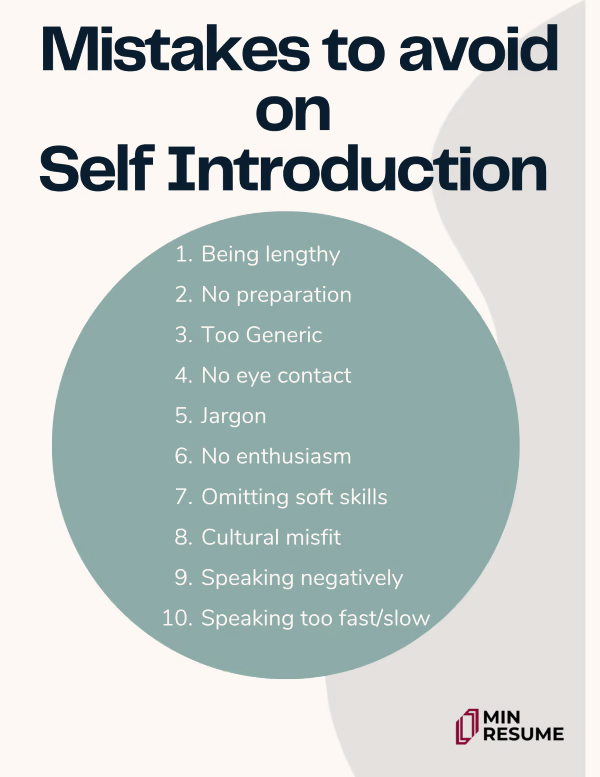
Your self introduction isn't just about words; it's also about your presence. Failing to make eye contact or displaying closed-off body language can convey nervousness or lack of confidence. Maintain eye contact and adopt open, approachable body language to project confidence.
5. Overwhelming with Technical Jargon:While highlighting your skills is important, inundating your self introduction with technical jargon that the interviewer may not understand can alienate them. Use clear, simple language to effectively communicate your expertise.
6. Not Demonstrating Enthusiasm:A lackluster delivery can give the impression that you're not genuinely interested in the role. Infuse your self introduction with genuine enthusiasm for the position and company to show that you're eager to contribute.
7. Omitting Soft Skills:Focusing solely on technical skills without mentioning your soft skills can paint an incomplete picture of your abilities. Highlight how your communication, teamwork, and problem-solving skills complement your technical prowess.
8. Disregarding the Company's Culture:Ignoring the company's values and culture in your self introduction can indicate a lack of research and alignment. Incorporate elements that demonstrate your understanding of their values and how you can contribute to their goals.
9. Bringing Up Negative Experiences:Avoid discussing negative experiences or shortcomings during your self introduction. Instead, focus on positive achievements and how you've overcome challenges.
10. Speaking Too Fast or Too Slow:The pace of your self introduction matters. Speaking too fast can make you difficult to understand, while speaking too slowly can convey nervousness. Aim for a moderate and steady pace that allows the interviewer to follow comfortably.
In conclusion, a well-crafted self introduction can set the tone for a successful interview, while mistakes can hinder your chances. By avoiding these common pitfalls, you'll be better equipped to introduce yourself confidently and leave a lasting positive impression. Remember, practice and preparation are key to delivering a self introduction that effectively showcases your qualifications and enthusiasm.
How long should self introduction be?
When it comes to job interviews and networking events, the self introduction is your initial chance to make a lasting impression. It's natural to wonder: how long should your self introduction be? Striking the right balance between being informative and concise is essential. Let us give you an idea on how long your responses should be.
The Goldilocks Principle: Not Too Short, Not Too LongJust like Goldilocks searching for the perfect porridge, your self introduction should be "just right." A self introduction that's too short might leave out important details, while one that's too long risks losing your audience's interest. The sweet spot usually falls between 30 seconds to 2 minutes, depending on the context and your audience.
The Context MattersThe appropriate length of your self introduction can vary based on the setting. In a formal job interview, you generally have a bit more time to provide a comprehensive overview of your background, skills, and aspirations. For casual networking events, a shorter and punchier introduction is usually more effective to capture attention quickly.
Consider Your Audience's Attention SpanIn an age of information overload, capturing someone's attention can be a challenge. Keep in mind that your audience's attention span may be limited. A concise introduction can keep them engaged and interested in learning more about you.
Key Components to IncludeRegardless of the length, your self introduction should include key components:
- Your name: Start by introducing yourself with your first name.
- Relevant background: Mention your educational background, relevant degrees, or certifications.
- Professional experience: Highlight key roles, responsibilities, and achievements that align with the position you're seeking or the context of the introduction.
- Skills and strengths: Emphasize a few key skills and strengths that are relevant to the situation.
- Enthusiasm: Express your excitement about the opportunity or topic at hand.
Crafting an effective self introduction takes practice. Tailor your introduction to fit different contexts and time limits. Practice delivering it confidently to ensure you strike the right balance between conciseness and impact.
Adapt to the SituationWhile a general guideline is helpful, be prepared to adjust the length of your self introduction based on the cues you're receiving from your audience. If you notice their attention waning, consider wrapping up your introduction sooner.
The ideal length of a self introduction depends on the context, your audience, and your ability to convey relevant information succinctly. Aim for a self introduction that provides essential details while maintaining the audience's interest. Remember, practice and adaptability are key to delivering a self introduction that leaves a positive and memorable impression.
Conclusion
Mastering the art of self introduction is an essential skill that can significantly impact the trajectory of your career. Throughout this article, we've explored the crucial elements that contribute to a successful self introduction in interviews. From creating a positive first impression to tailoring your introduction to align with the company's culture, every step plays a pivotal role in showcasing your qualifications, enthusiasm, and potential contribution.
Remember that your self introduction is your introduction to the world of opportunities. It's your chance to shine a spotlight on your accomplishments, skills, and aspirations, capturing the attention and interest of your interviewers. By following the tips provided in this guide, you're well-equipped to navigate the nuances of self introduction and make a memorable impression.
As you embark on your interview journey, take the time to craft thoughtful and engaging self introductions. Practice, preparation, and adaptability will be your allies in delivering introductions that resonate with interviewers and leave a lasting impact. Whether you're a fresh graduate entering the professional world or an experienced candidate aiming for new horizons, the principles outlined here will guide you towards effectively conveying your unique value and potential.
So, as you step into the interview room, remember the power of a well-crafted self introduction. It's your gateway to building connections, standing out from the crowd, and making your mark in the competitive landscape of job interviews. Your journey begins with that confident handshake, that genuine smile, and that compelling self introduction that sets the stage for a fruitful conversation. Here's to embracing opportunities, leaving positive imprints, and embarking on a successful interview journey.
If you have any questions or need further guidance on how to self introduce yourself effectively, don't hesitate to reach out. We're here to support you in your job search and help you present your skills effectively. Best of luck on your career journey!
Did you enjoy this article? Then these below might also be of interest to you
1. Resume writing demystified - One of our most popular articles that goes through a lot of misconceptions and clarifies them.
2. Resume format for freshers - If you are a recent college graduate, you would enjoy reading this article as it would provide you with information specific to preaparing your first resume.
3. 50 Hobbies and Interests to put on your resume - If you wondered what hobbies and interests you should put on your resume, this article can help you become more strategic about this fun topic.
